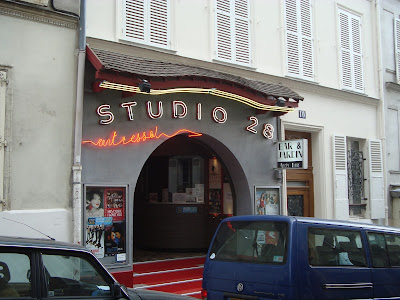From our
apartment in the 9th arrondissement, a 15-minute walk to the north
takes me to Montmartre’s still-thriving Studio 28 (site of the L’age d’or riot; home to chandeliers designed
by Cocteau), which continues mixing second-run repertory programming with
‘avant-premieres’ and director talks. This week alone I had the option of
seeing the premiere of Sophie Blondy’s L’étoile
du jour in the presence of both Blondy and star Denis Lavant, an afternoon
screening of Bertrand Tavernier’s epic Journey
Through French Cinema, or (if I had been feeling masochistic) a catch-up
viewing of Oliver Stone’s Snowden.
Twenty
minutes to the east of our place, the Cinéma des Cinéastes multiplex is
offering, among other things, Captain
Fantastic, Mungiu’s Graduation,
and Park Chan-wook’s The Handmaiden.
And the jewel in the crown of our local arthouse cinemas lies a mere eight
minutes away, again by foot, to the east: the Louxor, a fully refurbished,
Egyptian-style 1920s movie palace with three state-of-the-art screening rooms
(the largest of which, aptly named the ‘Salle Youssef Chahine’, sports two
balconies) and a rooftop patio bar. There, I could see what Brillante Mendoza
has been up to with Ma’ Rosa, get my
dander up in Ken Loach’s I, Daniel Blake,
or watch beautiful abstract explosions connote the end of the hippie era courtesy
of a re-issue of Antonioni’s Zabriskie
Point. (Programming quibble: who the hell programmed that for 10:30 a.m. on
a Sunday? On the other hand, if the Louxor crew can get an audience for a rehabilitated
classic like ZP on a Sunday morning –
as the they evidently can, given there is always something interesting slated
in that time slot – more power to them!)
All of the
above is a rather longwinded way of saying that cinephilia does seem as strong
as ever in Paris. Of course, all three of the above-mentioned cinemas benefit
from enlightened state and city programs that subsidise both operational costs and
equipment upgrades. This muddies the waters a little bit when trying to
determine exactly how much of that cinephilia resides in the souls of audience
members as opposed to budget functionaries in the mayor’s office, but the fact
that a recent 10:00 p.m. screening of Fritz Lang’s Man Hunt that I attended at the Louxor – an event that was accompanied by a scholarly
introduction and a post-film discussion – was 75% full is strong anecdotal
evidence that the love of cinema continues to flourish here. Given Netflix’s
slow progress in the French market coupled with a French law that makes it
impossible to (legally) stream any domestic cinema releases until 36 months
after the theatrical release, I think cinephilia is likely to continue to
flourish (at least until Donald Trump does something to bring about the end of
civilisation).
 |
| The Louxor Cinema after it closed in 1988. Now restored and reopened in 2013 (see above at para 2) |
Jack Vermee is a film programmer, writer, editor, educator and musician born in Canada and now living in Paris. He has worked for the Vancouver International Film Festival since 1987, chiefly as editor of and major contributor to the uniquely excellent program book issued by the festival. He currently serves as a programming consultant and associate editor at VIFF.



In the sixties, Studio 28 was celebrated for its frieze of the names of their favorite movie directors round the auditorium. I was pleased to be able to recognise Steinhoff and Avery. When it was tripled someone wanted to carry on the tradition, lettering A-M in number one and N-Z in number two but the enthusiasm has slid away with wall speakers obliterating some of the honorees. I wonder how many of the audience could identify any of these survivors from the great days on movie freaking now?
ReplyDelete